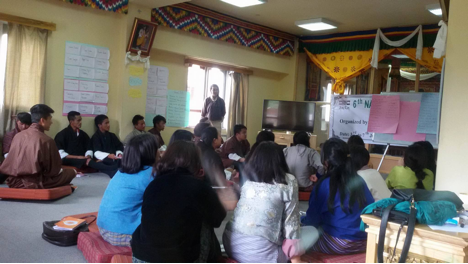Happiness Index and Women’s Reproductive Rights in Bhutan- By Youth Champion Wangchuk Dema

While this is wonderful idea that has earned praise, there is still much to be done in terms of women’s health and rights issues to ensure their happiness……
The difficult terrain and simpler life means access to emergency healthcare is not always easy or prompt. This has led to an extremely high maternal mortality rate which hovers around 180 even now.
Currently 26% of its population is under the age of 25 and in this context Y-PEER Bhutan recently conducted a five-day National training of trainers. The discussions focused on sexual and reproductive health including safe abortion, fertility and pregnancy, and the challenges posed by sexually transmitted infections.
During the discussions on early pregnancy a major concern that emerged was the impact on the girl’s health as her body would not be prepared to deliver a baby and later, there could be post-pregnancy complications. Discontinuing studies, financial instability, abandoning of child by father, stigma from society, were identified as social and cultural issues that may even be a trigger for the girl to commit suicide.
These apprehensions then led to a discussion on access to safe abortion services. At present in case of an unwanted pregnancy, women and girls are unable to access safe abortion services since there is no law or policy document specifying if it is legal in Bhutan. In such a situation these women and girls are forced to cross the border to get an abortion done which could be unsafe and dangerous. Through the discussions the participants came to an understanding that Bhutan is no exception in terms of unsafe abortion and that unsafe abortion amongst young women is a major health risk.
On the fourth day of the training the participants discussed at length early pregnancies which are unplanned/unwanted pregnancies and their root causes – the most common cause identified by participants was the unmet need for contraception among the youth; even though contraceptives are available, they are not easily accessible. This means that young girls and boys are embarrassed to go and get the contraceptives, which largely emerges from the lack of comprehensive sexuality and reproductive health awareness.
The trainers recommended to the participants that they could either contact the Y-PEER in most parts of the country (in about 9 institutes) or else, there are three Adolescent Friendly Health Services in the country. The session ended with screening of a video on safe abortion and gender equality, which actually motivated a lot of them and helped them understand the importance of reproductive health and rights among young girls than boys.
The outcome of the sessions and discussions was that many of participants had come with the notion that abortion should remain illegal as it goes against the teachings of Buddhism. As the training proceeded, first discussion on abortion convinced a handful of participants that abortion should be legalized while others remained unmoved. However, in the second discussion, everyone was convinced except two. Fortunately, during the very last session on abortion, they also understood our perspective and the need for safe abortion services for women and girls as a health and rights issue.
We hope that soon the happiness index for women and girls in Bhutan will also include their happiness at being able to understand and control their bodies and their fertility!






